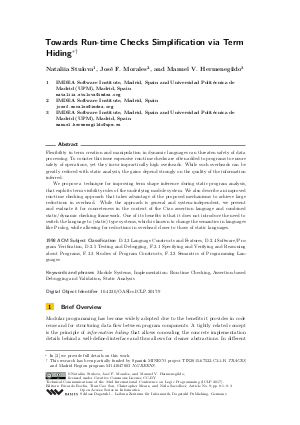Towards Run-time Checks Simplification via Term Hiding
Authors Nataliia Stulova, Jose F. Morales, Manuel V. Hermenegildo
-
Part of:
Volume:
Technical Communications of the 33rd International Conference on Logic Programming (ICLP 2017)
Part of: Series: Open Access Series in Informatics (OASIcs)
Part of: Conference: International Conference on Logic Programming (ICLP) - License:
 Creative Commons Attribution 3.0 Unported license
Creative Commons Attribution 3.0 Unported license
- Publication Date: 2018-02-14
File

PDF
OASIcs.ICLP.2017.9.pdf
- Filesize: 387 kB
- 3 pages
Document Identifiers
Subject Classification
Keywords
- Module Systems
- Implementation
- Run-time Checking
- Assertion-based Debugging and Validation
- Static Analysis
Metrics
- Access Statistics
-
Total Accesses (updated on a weekly basis)
0Document
0Metadata
Abstract
One of the most attractive features of untyped languages for programmers is the flexibility in term creation and manipulation. However, with such power comes the responsibility of ensuring correctness of operations. A solution is adding run-time checks to the program via assertions, but this can introduce overheads that are in many cases impractical. While such overheads can be greatly reduced with static analysis, the gains depend strongly on the quality of the information inferred. Reusable libraries, i.e., library modules that are pre-compiled independently of the client, pose special challenges in this context. We propose a relaxed form of atom-based module system (which hides only a selected set of functor symbols but still provides a strict mechanism to prevent breaking visibility rules across modules) that can enrich significantly the shape information that can be inferred in reusable modular programs. We also propose an improved run-time checking approach that takes advantage of the proposed mechanisms to achieve large reductions in overhead, closer to those of static languages even in the reusable-library context. While the approach is general and system-independent, we present it for concreteness in the context of the Ciao assertion language and combined static/dynamic checking framework. Our method maintains full expressiveness of the checks in this context. Contrary to other approaches it does not introduce the need to switch the language to (static) type systems, which is known to change the semantics in languages like Prolog. We also study the approach experimentally and evaluate the overhead reduction achieved in the run-time checks.
Cite As Get BibTex
Nataliia Stulova, Jose F. Morales, and Manuel V. Hermenegildo. Towards Run-time Checks Simplification via Term Hiding. In Technical Communications of the 33rd International Conference on Logic Programming (ICLP 2017). Open Access Series in Informatics (OASIcs), Volume 58, pp. 9:1-9:3, Schloss Dagstuhl – Leibniz-Zentrum für Informatik (2018)
https://doi.org/10.4230/OASIcs.ICLP.2017.9
BibTex
@InProceedings{stulova_et_al:OASIcs.ICLP.2017.9,
author = {Stulova, Nataliia and Morales, Jose F. and Hermenegildo, Manuel V.},
title = {{Towards Run-time Checks Simplification via Term Hiding}},
booktitle = {Technical Communications of the 33rd International Conference on Logic Programming (ICLP 2017)},
pages = {9:1--9:3},
series = {Open Access Series in Informatics (OASIcs)},
ISBN = {978-3-95977-058-3},
ISSN = {2190-6807},
year = {2018},
volume = {58},
editor = {Rocha, Ricardo and Son, Tran Cao and Mears, Christopher and Saeedloei, Neda},
publisher = {Schloss Dagstuhl -- Leibniz-Zentrum f{\"u}r Informatik},
address = {Dagstuhl, Germany},
URL = {https://drops.dagstuhl.de/entities/document/10.4230/OASIcs.ICLP.2017.9},
URN = {urn:nbn:de:0030-drops-84601},
doi = {10.4230/OASIcs.ICLP.2017.9},
annote = {Keywords: Module Systems, Implementation, Run-time Checking, Assertion-based Debugging and Validation, Static Analysis}
}
Author Details
References
- M. V. Hermenegildo, F. Bueno, M. Carro, P. López, E. Mera, J. F. Morales, and G. Puebla. An Overview of Ciao and its Design Philosophy. Theory and Practice of Logic Programming, 12(1-2):219-252, January 2012. CoRR abs/1102.5497 [cs.PL]. URL: http://dx.doi.org/10.1017/S1471068411000457.
-
N. Stulova, J. F. Morales, and M. V. Hermenegildo. Term Hiding and its Impact on Run-time Check Simplification. Technical Report CLIP-1/2017.0, The CLIP Lab, May 2017. CoRR abs/1705.06662 [cs.PL].

